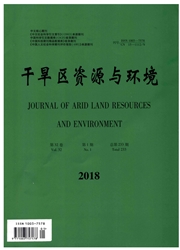

 中文摘要:
中文摘要:
To characterize the groundwater in the Ejina Basin,surface and groundwater samples were collected in May and October of 2002.On-site analyses included temperature,electrical conductance(EC),total alkalinity(as HCO 3) by titration,and pH.Chemical analyses were undertaken at the Geochemistry Laboratory of the Cold and Arid Region Environmental and Engineering Institute,Chinese Academy of Sciences,Lanzhou,China.The pH of the groundwater ranged from 7.18 to 8.90 with an average value of 7.72,indicating an alkaline nature.The total dissolved solids(TDS) of the groundwater ranged from 567.5 to 5,954.4 mg/L with an average of 1,543.1 mg/L and a standard deviation of 1,471.8 mg/L.According to the groundwater salinity classification of Robinove et al.(1958),47.4 percent of the samples were brackish and the remainder were fresh water.The ion concentration of the groundwater along the riverbed and near the southern margin of the basin were lower than those farther away from the riverbed.The groundwater in the study area was of Na +-HCO 3 type near the bank of the Heihe River and in the southern margin of the basin,while Na +-SO 4 2-Cl type samples were observed in the terminal lake region.In the desert area the groundwater reached a TDS of 3,000-6,000 mg/L and was predominantly by a Na +-Cl chemistry.Br/Cl for the water of Ejina Basin indicates an evaporite origin for the groundwater with a strongly depleted Br/Cl ratio(average 0.000484).The surface water was slightly enriched in Br/Cl(average 0.000711) compared with groundwater.The calculated saturation index(SI) for calcite and dolomite of the groundwater samples range from 0.89 to 1.31 and 1.67 to 2.67 with averaged 0.24 and 0.61,respectively.About 97 percent of the groundwater samples were kinetically oversaturated with respect to calcite and dolomite,and all the samples were below the equilibrium state with gypsum.Using isotope and hydrochemical analyses,this study investigated the groundwater evolution and its residence time.The groundwater content was mainly determi
 英文摘要:
英文摘要:
To characterize the groundwater in the Ejina Basin,surface and groundwater samples were collected in May and October of 2002.On-site analyses included temperature,electrical conductance(EC),total alkalinity(as HCO 3) by titration,and pH.Chemical analyses were undertaken at the Geochemistry Laboratory of the Cold and Arid Region Environmental and Engineering Institute,Chinese Academy of Sciences,Lanzhou,China.The pH of the groundwater ranged from 7.18 to 8.90 with an average value of 7.72,indicating an alkaline nature.The total dissolved solids(TDS) of the groundwater ranged from 567.5 to 5,954.4 mg/L with an average of 1,543.1 mg/L and a standard deviation of 1,471.8 mg/L.According to the groundwater salinity classification of Robinove et al.(1958),47.4 percent of the samples were brackish and the remainder were fresh water.The ion concentration of the groundwater along the riverbed and near the southern margin of the basin were lower than those farther away from the riverbed.The groundwater in the study area was of Na +-HCO 3 type near the bank of the Heihe River and in the southern margin of the basin,while Na +-SO 4 2-Cl type samples were observed in the terminal lake region.In the desert area the groundwater reached a TDS of 3,000-6,000 mg/L and was predominantly by a Na +-Cl chemistry.Br/Cl for the water of Ejina Basin indicates an evaporite origin for the groundwater with a strongly depleted Br/Cl ratio(average 0.000484).The surface water was slightly enriched in Br/Cl(average 0.000711) compared with groundwater.The calculated saturation index(SI) for calcite and dolomite of the groundwater samples range from 0.89 to 1.31 and 1.67 to 2.67 with averaged 0.24 and 0.61,respectively.About 97 percent of the groundwater samples were kinetically oversaturated with respect to calcite and dolomite,and all the samples were below the equilibrium state with gypsum.Using isotope and hydrochemical analyses,this study investigated the groundwater evolution and its residence time.The groundwater content was mainly determi
 同期刊论文项目
同期刊论文项目
 同项目期刊论文
同项目期刊论文
 Characterization of groundwater in the Ejina Basin, northwest China: hydrochemical and environmental
Characterization of groundwater in the Ejina Basin, northwest China: hydrochemical and environmental Influence of environmental, root, and stand paramenters on soil surface CO2 efflux in a Populus enph
Influence of environmental, root, and stand paramenters on soil surface CO2 efflux in a Populus enph Relationships between foliar carbon isotope discrimination with potassium concentration and ash cont
Relationships between foliar carbon isotope discrimination with potassium concentration and ash cont 期刊信息
期刊信息
